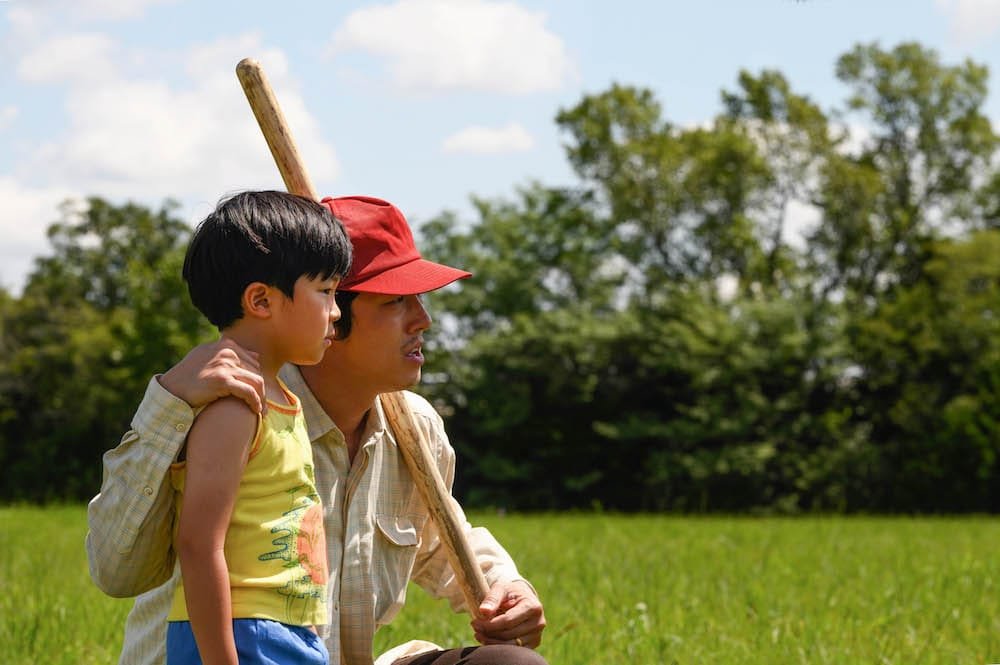
REVIEW: Minari
- November 08, 2020
- by
- Ivan Moore
What are some of the earliest memories from your childhood? As a child of the 1980’s, I remember how dark every room of our house seemed with our shiny wood paneling that was all the rage then (and that still persists behind a recent coat of white paint.) You know the kind. It is the first thing torn down on every home improvement show. All of the spaces I inhabited as a child felt so big, filled with different textures and fabrics from the leafy forest patterns of our living room cushions to the sticky, red faux leather of my family’s car seats. What did your world look like? What were you absorbing and learning as a child? Minari (pronounced MEE-NAH-REE) is a recent film that may just have you revisiting your own childhood and evaluating your own family.
The movie depicts an experience that is, as star Steven Yeun puts it, “deeply American.” Yet, it might not be the American experience you know. Through the eyes of David, the youngest child of a Korean American family in the 1980’s, we see a snapshot of their experience trying to carve out a piece of America they will call their own. The story comes partially from the memory of director Lee Isaac Chung, whose own family immigrated to America and settled in California before relocating to the middle-of-nowhere Arkansas. In Arkansas, David’s father, Jacob procures a larger piece of land then they could have ever had in California. Jacob’s desire is to eventually leave his current job of gendering baby chicks and grow a commercial farm on his new plot in Razorback country.
Prior to 1965, the US was limiting the percentage of immigrants that could reside in the country. Once the Immigration and Nationality Act of 1965 lifted those restrictions, there was an incredible rise in Koreans moving to America. From 1970 to 1980 that Korean population in America rose from 39,000 to 290,000. David’s family was a part of this wave, but this isn’t the story of them moving to America. As we see Jacob and his wife Monica interact, it’s obvious that this family has been working and trying to forge their path in their new country for a while. There’s tension, exhaustion, and unbalanced expectations.
Monica was comfortable in California. She thought they had decent jobs and a community that helped them feel like they were a little closer to home. For her, Arkansas feels so much farther away from everything. There is a lack of security in the couple’s relationship in the film and that particularly puts pressure on Monica to combat her husband’s lofty dreams. These dreams, though, also carry an extra weight for Jacob. Tied into his tomato plants and irrigation wells is his entire masculinity. With these parcels of land, Jacob is gambling with his manhood, his reputation as a father and provider. He has to prove that he can do this on his own. Jacob is determined to do it without the help of neighbors, friends, family, other farmers, or God.
It would be hard for David’s family to avoid faith. The Korean Presbyterian Church was a staple in Korean American communities. In the film, it is one of the first things on Monica’s mind. She clearly has found security in the church before. However, church in rural Arkansas is very different from what they’re used to. This is best expressed through Jacob’s somewhat one-sided partnership with Paul, a local laborer who wants to help Jacob succeed, and just be Jacob’s friend. Throughout the film we see Paul praying in tongues, anointing things with oil, casting out demons Jacob doesn’t see, and bearing his own literal cross every Sunday. In many ways, the church service they do attend in Arkansas feels like the most unfamiliar place they’ve been yet.
Really David’s family is trying to figure America out. What is good about this place? What is familiar? Where can they thrive? How can they survive? It is that daily grind that pulls you in. Minari is a wonderful film. Chung’s story is filled with innocence and complexity. We are trying to make sense of everything right along with David. Most perplexing to him is his maternal grandmother who curses, plays cards, and does many things different from the picture America has given David of what a grandma should be. He also doesn’t understand why he would drink a potent Korean tea over delicious Mountain Dew. The audience is guided through this drama by probably the best performances I’ve seen all year. From tiny new-comer Alan S. Kim to Remember the Titans’ Will Patton, this cast has so much to offer. Yeri Han, who plays Monica in the film can make you cry as she feels so stranded and not at “home” and then tear your heart completely out as she throws verbal and non-verbal daggers of disappointment at Jacob. You really do feel this family’s struggle as the story progresses.
The film’s title comes from a plant often used in Asian cooking. At one point, David is dragged by his grandma into a damp creek bed to plant some. It is said that minari grows wherever it is planted. It is a resilient herb that can thrive in shade or sun as long as it has water. It grows fast and is a cut-and-come-again plant that just keeps coming back. What makes David’s family keep going? There are moments in the movie that feel like things will never recover. Chung’s real-life family persisted, and so many immigrant families before and after his have as well. America is supposed to be fertile soil, but sometimes the ground is hard and dry. Thankfully, the roots of hope, faith, and family can often grow in harsh conditions.






